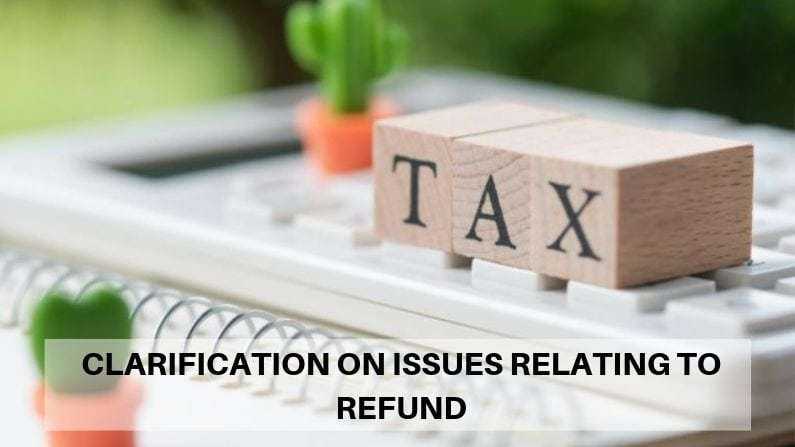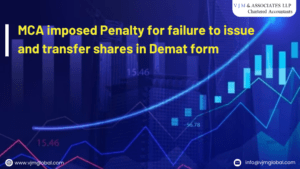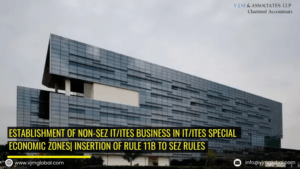Various representations have been received seeking clarification on issues relating to refund. In order to clarify these issues and to ensure uniformity in the implementation of the provisions of law across the field formations, the Board, in exercise of its powers conferred by section 168 (1) of the Central Goods and Services Tax Act, 2017 (hereinafter referred to as “CGST Act”), hereby clarifies the issues as detailed.
1. Submission of invoices for processing of claims of refund
- Now no need to submit copies of invoices (either original or duplicate).
- Refund claim shall be accompanied by a print-out of FORM GSTR-2A of the claimant for the relevant period for which the refund is claimed.
- The proper officer shall rely upon FORM GSTR-2A as an evidence.
- Hard copy of invoices may be asked only where these invoices are not present in GSTR-2A.
- Following needs to be submit by Claimant-
- Details of the invoices in annexure A (format specified in circular)
- Application for refund claim in FORM GST RFD-01A
- Application reference number (ARN)
2. Re-credit of electronic credit ledger in case of rejection of refund claim:
Rejection of refund on account of ineligible ITC:
- The proper office shall order for the rejected amount to be re-credited to the electronic credit ledger of the claimant using FORM GST RFD-01B.
- For recovery of this amount, a demand notice shall have to be simultaneously issued to the claimant under section 73 or 74 of the CGST Act.
- In case demand is confirmed, the said amount shall be added to the electronic liability register of the claimant through FORM GST DRC- 07.
- Alternatively, the claimant can voluntarily pay this amount, along with interest and penalty, if applicable, before service of the demand notice, and intimate the same to the proper officer in FORM GST DRC-03
Rejection of refund for any reason other than eligible credit:
- The rejected amount shall be re-credited to the electronic credit ledger of the claimant using FORM GST RFD-01B.
- Before recredited, undertaking from claimant will be taken that no further appeal will be filled.
3. Supplies imported with benefit of reduced tax or no tax:
1. Goods / supplies which has been imported on which benefit of reduced tax or no tax incidence under certain specified notification has been availed (i.e. Advance Authorization/EPCG), shall not be eligible for refund on integrated tax paid on export of goods or services.
4. Disbursal of refund amount after sanctioning by the proper officer
- A few cases have come to notice where a tax authority, after receiving a sanction order from the counterpart tax authority (Centre or State), has refused to disburse the relevant sanctioned amount calling into question the validity of the sanction order on certain grounds.
- It is clarified that the remedy for correction of an incorrect or erroneous sanction orderlies in filing an appeal against such order and not in the withholding of the disbursement of the sanctioned amount.
- It is hereby clarified that neither the State nor the Central tax authorities shall refuse to disburse the amount sanctioned by the counterpart tax authority on any grounds whatsoever, except under sub-section (11) of section 54 of the CGST Act.
5. Status of refund claim after issuance of deficiency memo
- As per certain notification and clarification, once deficiency memo has been issued in RFD-03, the refund claim will have to file fresh refund application.
- It has been learnt that certain field formations are issuing show cause notices to the claimants in cases where the refund application is not re-submitted after the issuance of a deficiency memo.
- These show-cause-notices are being subsequently adjudicated and orders are being passed in FORM GST RFD-04/06.
- A refund application which is re-submitted after the issuance of a deficiency memo shall have to be treated as a fresh application and no show-cause-notice is required to be issued.
6. Treatment of refund applications where the amount claimed is less than rupees one thousand
- As per section 54(14), no refund shall be paid if the amount is less than Rs. 1,000/-.
- In this regard, it is clarified that the limit of rupees one thousand shall be applied for each tax head separately and not cumulatively.
- The limit would not apply in cases of refund of excess balance in the electronic cash ledger.
7. Claim for refund filed by an Input Service Distributor, a person paying tax under section 10 or a non-resident taxable person:
7.1 Issue
Doubts have been raised in case of claims for refund filed by an Input Service Distributor (ISD for short), a person paying tax under section 10 of the CGST Act (composition taxpayer for short)or a non-resident taxable person in light of para 2.0 of Circular No. 24/24/2017-GST dated 21.12.2017 which mandates that the refund claim for a tax period may be filed only after filing the details in FORM GSTR-1 for the said tax period and that it is also to be ensured that a valid return in FORM GSTR-3B has been filed for the last tax period before the one in which the refund application is being filed.
7.2 Suggestion
In this regard, attention is invited to sub-section (1) of section 37 of the CGST Act read with rule 59 of the Central Goods and Services Tax Rules, 2017 (CGST Rules for short) which mandates that every registered person, other than an Input Service Distributor or a non-resident taxable person or a person paying tax under the provisions of section 10 or section 51 or section 52, shall furnish the details of outward supplies of goods or services or both effected during a tax period in FORM GSTR-1. Further, as per sub-section (2) of section 39 of the CGST Act read with rule 62 of the CGST Rules, a composition taxpayer is required to furnish the return in FORM GSTR-4; as per sub-section (4) of section 39 of the CGST Act read with rule 65 of the CGST Rules, an ISD is required to furnish the return in FORM GSTR-6 and as per sub-section (5) of section 39 of the CGST Act read with rule 63 of the CGST Rules, a non-resident taxable person is required to furnish the return in FORM GSTR-5.
Thus, it is clarified that in case of a claim for refund of balance in the electronic cash ledger filed by an ISD or a composition taxpayer; and the claim for refund of balance in the electronic cash and/or credit ledger by a non-resident taxable person, the filing of the details in FORM GSTR-1 and the return in FORM GSTR-3B is not mandatory. Instead, the return in FORM GSTR-4 filed by a composition taxpayer, the details in FORM GSTR-6 filed by an ISD and the return in FORM GSTR-5 filed by a non-resident taxable person shall be sufficient for claiming the said refund.
8. Application for refund of integrated tax paid on export of services and supplies made to a Special Economic Zone developer or a Special Economic Zone unit:
8.1 Issue
It has been represented that while filing the return in FORM GSTR-3B for a given tax period, certain registered persons committed errors in declaring the export of services on payment of integrated tax or zero rated supplies made to a Special Economic Zone developer or a Special Economic Zone unit on payment of integrated tax. They have shown such supplies in the Table under column 3.1(a) instead of showing them in column 3.1(b) of FORM GSTR-3B whilst they have shown the correct details in Table 6A or 6B of FORM GSTR-1 for the relevant tax period and duly discharged their tax liabilities. Such registered persons are unable to file the refund application in FORM GST RFD-01A for refund of integrated tax paid on the export of services or on supplies made to a SEZ developer or a SEZ unit on the GST common portal because of an in-built validation check in the system which restricts the refund amount claimed (integrated tax/cess) to the amount of integrated tax/cess mentioned under column 3.1(b) of FORM GSTR-3B (zero rated supplies) filed for the corresponding tax period.
8.2 Suggestion
In this regard, it is clarified that for the tax periods commencing from 01.07.2017 to 31.03.2018, such registered persons shall be allowed to file the refund application in FORM GST RFD-01A on the common portal subject to the condition that the amount of refund of integrated tax/cess claimed shall not be more than the aggregate amount of integrated tax/cess mentioned in the Table under columns 3.1(a), 3.1(b) and 3.1(c) of FORM GSTR-3B filed for the corresponding tax period.
9. Refund of unutilized input tax credit of compensation cess availed on inputs in cases where the final product is not subject to the levy of compensation cess:
9.1 Issue
Doubts have been raised whether an exporter is eligible to claim refund of unutilized input tax credit of compensation cess paid on inputs, where the final product is not leviable to compensation cess. For instance, cess is levied on coal, which is an input for the manufacture of aluminum products, whereas cess is not levied on aluminum products.
9.2 Suggestion
In this regard, section 16(2) of the Integrated Goods and Services Tax Act, 2017 (IGST Act for short) states that, subject to the provisions of section 17(5) of the CGST Act, credit of input tax may be availed for making zero rated supplies. Further, as per section 8 of the Goods and Services Tax (Compensation to States) Act, 2017, (hereafter referred to as the Cess Act), all goods and services specified in the Schedule to the Cess Act are leviable to cess under the Cess Act; and vide section 11 (2) of the Cess Act, section 16 of the IGST Act is mutatis mutandis made applicable to inter-State supplies of all such goods and services. Thus, it implies that all supplies of such goods and services are zero rated under the Cess Act. Moreover, as section 17(5) of the CGST Act does not restrict the availment of input tax credit of compensation cess on coal, it is clarified that a registered person making zero rated supply of aluminum products under bond or LUT may claim refund of unutilized credit including that of compensation cess paid on coal.
Such registered persons may also make zero-rated supply of aluminum products on payment of integrated tax but they cannot utilize the credit of the compensation cess paid on coal for payment of integrated tax in view of the proviso to section 11(2) of the Cess Act, which allows the utilization of the input tax credit of cess, only for the payment of cess on the outward supplies. Accordingly, they cannot claim refund of compensation cess in case of zero-rated supply on payment of integrated tax.
10. Whether bond or Letter of Undertaking (LUT) is required in the case of zero rated supply of exempted or non-GST goods and whether refund can be claimed by the exporter of exempted or non-GST goods?
10.1 Issue
As per section 16(2) of the IGST Act, credit of input tax may be availed for making zero rated supplies, notwithstanding that such supply is an exempt supply. Whereas, as per section 2 (47) of the CGST Act, exempt supply includes non-taxable supply. Further, as per section 16(3) of the IGST Act, a registered person making zero rated supply shall be eligible to claim refund when he either makes supply of goods or services or both under bond or letter of undertaking (LUT) or makes such supply on payment of integrated tax.
10.2 Suggestion
However, in case of zero rated supply of exempted or non-GST goods, the requirement for furnishing a bond or LUT cannot be insisted upon. It is thus, clarified that in respect of refund claims on account of export of non-GST and exempted goods without payment of integrated tax; LUT/bond is not required. Such registered persons exporting non-GST goods shall comply with the requirements prescribed under the existing law (i.e. Central Excise Act, 1944 or the VAT law of the respective State) or under the Customs Act, 1962, if any.
Further, the exporter would be eligible for refund of unutilized input tax credit of central tax, state tax, union territory tax, integrated tax and compensation cess in such cases.
11. What is the scope of the restriction imposed by rule 96(10) of the CGST Rules, regarding non-availment of the benefit of notification Nos. 48/2017-Central Tax dated the 18.10.2017, 40/2017-Central Tax (Rate) dated 23.10.2017, 41/2017-Integrated Tax (Rate) dated 23.10.2017, 78/2017-Customs dated 13.10.2017 or 79/2017-Customs dated 13.10.2017?
11.1 Issue
Sub-rule (10) of rule 96 of the CGST Rules seeks to prevent an exporter, who is receiving goods from suppliers availing the benefit of certain specified notifications under which they supply goods without payment of tax or at reduced rate of tax, from exporting goods under payment of integrated tax. This is to ensure that the exporter does not utilise the input tax credit availed on other domestic supplies received for making the payment of integrated tax on export of goods.
11.2 Suggestion
However, the said restriction is not applicable to an exporter who has procured goods from suppliers who have not availed the benefits of the specified notifications for making their outward supplies. Further, the said restriction is also not applicable to an exporter who has procured goods from suppliers who have, in turn, received goods from registered persons availing the benefits of these notifications since the exporter did not directly procure these goods without payment of tax or at reduced rate of tax.
Thus, the restriction under sub-rule (10) of rule 96 of the CGST Rules is only applicable to those exporters who are directly receiving goods from those suppliers who are availing the benefit under Notification No. 48/2017-Central Tax dated the 18th October, 2017, notification No. 40/2017-Central Tax (Rate) dated the 23rd October, 2017, or notification No. 41/2017-Integrated Tax (Rate) dated the 23rd October, 2017 or notification No. 78/2017-Customs dated the 13th October, 2017 or notification No. 79/2017-Customs dated the 13th October, 2017.
Further, there might be a scenario where a manufacturer might have imported capital goods by availing the benefit of Notification No. 78/2017-Customs dated 13.10.2017 or 79/2017-Customs dated 13.10.2017. Thereafter, goods manufactured from such capital goods may be supplied to an exporter. It is hereby clarified that this restriction does not apply to such inward supplies of an exporter.
12. Non-Availment of drawback
The third proviso to sec 54(3) of the CGST Act states that no refund of ITC shall be allowed in cases where the supplier of goods or services or both avails of drawback in respect of central tax.
1. Supplier availing of drawback only with respect to basic customs duty shall be eligible for refund of unutilized ITC of CGST/SGST/IGST.
2. Refund of eligible ITC on account of State tax shall be available even if the supplier of goods or services or both has availed of drawback in respect of central tax.
13. Refund claims are not being processed on account of mis-matches between data contained in FORM GSTR-1, FORM GSTR-3B and shipping bills/bills of export
1. Taxpayer has committed an error while entering the details of an invoice/shipping bill/bill of export in Table 6A or Table 6B of FORM GSTR-1, he can rectify the same in Table 9 of FORM GSTR-1.
It is advised that while processing refund claims on account of zero rated supplies, information contained in Table 9 of FORM GSTR-1 of the subsequent tax periods should be taken into cognizance, wherever applicable.
2. In case of discrepancies between the data furnished by the taxpayer in FORM GSTR-3B and FORM GSTR-1, the officer shall refer to the circular no. 26/26/2017 – GST dated 29th December, 2017.
14. Exports without LUT
Zero rated supplies have been made before filing the LUT and refund claims for unutilized ITC have been filed.
1. The substantive benefits of zero rating may not be denied where it has been established that exports in terms of the relevant provisions have been made.
2. The delay in furnishing of LUT in such cases may be condoned and the facility for export under LUT may be allowed on ex post facto basis taking into account the facts and circumstances of each case. The substantive benefits of zero rating may not be denied where it has been established that exports in terms of the relevant provisions have been made.
The delay in furnishing of LUT in such cases may be condoned and the facility for export under LUT may be allowed on ex post facto basis taking into account the facts and circumstances of each case.
15. Exports after specified period
As per Rule 96A(1), the CGST rules provides
a. In case of Exports of Goods against LUT: Exporters shall be liable to pay IGST within 15 days after expiry of 3 months or extended period from the invoice date in case export has not been in such 3 month period.
b. In case of Exports of Services against LUT: Exporters shall be liable to pay IGST within 15 days after expiry of 1 year or extended period from the invoice date, if the payment of such services is not received by the exporter in convertible foreign exchange.
It has been reported that the exporters have been asked to pay integrated tax where the goods have been exported but not within three months from the date of the issue of the invoice for export.
1. It is emphasised that exports have been zero rated under the IGST Act 2017 and as long as goods have actually been exported even after a period of three months, payment of integrated tax first and claiming refund at a subsequent date should not be insisted upon.
2. In such cases, the jurisdictional Commissioner may consider granting extension of time limit for export as provided in the said sub-rule on post facto basis keeping in view the facts and circumstances of each case. The same principle should be followed in case of export of services.
17. Deficiency memo
Clarification has been sought whether with respect to a refund claim, deficiency memo can be issued more than once.
1. Only one deficiency memo for one refund application can be issued unless the deficiencies pointed out in the original memo remain un-rectified.
2. The applicant is required to file a fresh refund application, manually in FORM GST RFD-01A.
3. This fresh application would be accompanied by the following:
a. the original ARN,
b. debit entry number generated originally.
c. a hard copy of the refund application filed online earlier.
18. Self-declaration for non-prosecution
Self-declaration with every refund claim to the effect that the claimant has not been prosecuted.
1. Asking for self–declaration with every refund claim where the exports have been made under LUT is not warranted as this requirement is already satisfied in case of exports under LUT.
2. Circular No. 8/8/2017-GST dated 4th October 2017, mentions that a person intending to export under LUT is required to give a self-declaration at the time of submission of LUT that he has not been prosecuted. Persons who are not eligible to export under LUT are required to export under bond.
19. Refund of transitional credit
Whether refund of transitional credit would be allowed.
It is clarified that as the transitional credit pertains to duties and taxes paid under the existing laws viz., under Central Excise Act, 1944 and Chapter V of the Finance Act, 1994, the same cannot be said to have been availed during the relevant period and thus, cannot be treated as part of ‘Net ITC’ and refund cannot be availed under GST. Learn more about IGST Refund be seek
Discrepancy between values of GST invoice and shipping bill/bill of export
Where the refund of unutilized ITC on account of export of goods is claimed and the value declared in the tax invoice is different from the export value declared in the corresponding shipping bill under the Customs Act, refund claims are not being processed.
1. An exporter, at the time of supply of goods, declares that the goods are for export and the same is done under an invoice issued under rule 46 of the CGST Rules.
2. The value recorded in the GST invoice should normally be the transaction value as determined under section 15 of the CGST Act read with the rules made thereunder.
3. The same transaction value should normally be recorded in the corresponding shipping bill/bill of export.
4. The value of the goods declared in the GST invoice and the value in the corresponding shipping bill/bill of export should be examined and the lower of the two values should be sanctioned as refund
20. Refund of taxes paid under existing laws
It is observed that certain taxpayers have applied for such refund claims in FORM GST RFD-01A.
1. Refunds of tax/duty paid under the existing law shall be disposed of in accordance with the provisions of the existing law.
2. Where any claim for refund of CENVAT credit is fully or partially rejected, the amount so rejected shall lapse and will not be transitioned into GST.
3. No refund of the amount of CENVAT credit is granted in case the said amount has been transitioned under GST.
21. Filing frequency of Refunds
Various representations have been made to the Board regarding the period for which refund applications can be filed.
In many cases, Exports may not be made in period in which the inputs or input services were received and ITC has been availed.
Similarly, there may be cases where exports may have been made in a period but no ITC has been availed in the said period.
1. Exporters, at his option, may file a refund claim for one calendar month/quarter or by clubbing successive calendar months/quarters.
2. The calendar month(s) / quarter(s) for which refund claim has been filed, however, cannot spread across different financial years.
22. BRC / FIRC for export of goods
1. The realization of convertible foreign exchange is one of the conditions for export of services.
2. A statement containing the number and date of shipping bills or bills of export and the number and the date of the relevant export invoices is required to be submitted along with the claim for refund in case of exports of goods.
3. Insistence on proof of realization of export proceeds for processing of refund claims related to export of goods has not been envisaged in the law and should not be insisted upon.
23. Supplies to Merchant Exporters
1. The benefit of supplies at the concessional rate is subject to certain conditions and the said benefit is optional.
2. The exporter will be eligible to take credit of the tax @ 0.05% / 0.1% paid by him.
3. The supplier who supplies goods at the concessional rate is also eligible for a refund on account of inverted tax structure as per the sec 54(3)(ii) of CGST Act.
4. The exporter of such goods can export the goods only under LUT / bond and cannot export on payment of integrated tax.
24. Requirement of invoices for processing of claims for refund
It has been brought to the notice of the Board that for processing of refund claims, copies of invoices and other additional information are being insisted upon by many field formations.
1. For the processing of refund claims of ITC, verifying the invoice details is quintessential.
2. In a completely electronic environment, the information of the recipients’ invoices would be dependent upon the suppliers’ information, thus putting an in-built check-and-balance in the system.
3. However, as the refund claims are being filed by the recipient in a semi-electronic environment and are completely based on the information provided by them, it is necessary that invoices are scrutinized.
25. List of documents required for processing of Refund
25.1 Export of Services with payment of tax (Refund of IGST paid on export of services)
- Copy of FORM RFD-01A filed on common portal
- Copy of Statement 2 of FORM RFD-01A
- Invoices w.r.t. input, input services and capital goods
- BRC/FIRC for export of services
- Undertaking / Declaration in FORM RFD-01A
25.2 Export (goods or services) without payment of tax (Refund of accumulated ITC of IGST / CGST / SGST / UTGST / Cess)
- Copy of FORM RFD-01A filed on common portal
- Copy of Statement 3A of FORM RFD-01A generated on common portal
- Copy of Statement 3 of FORM RFD-01A
- Invoices w.r.t. input and input services
- BRC/FIRC for export of services
- Undertaking / Declaration in FORM RFD-01A
Read all about How to get Refund under GST






